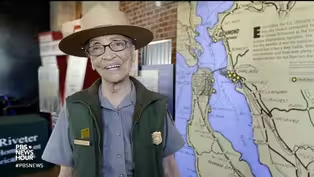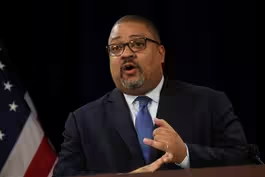
Millions could lose Medicaid coverage as COVID program ends
Clip: 4/11/2023 | 8m 48sVideo has Closed Captions
Millions at risk of losing Medicaid coverage as pandemic-era program ends
Before the pandemic, people had to re-enroll for Medicaid every year by submitting paperwork. That was suspended when COVID hit, but starting this month, Medicaid recipients have to make sure they are enrolled again. Not everyone will receive a notice or complete the applications on time and many will fall through the cracks due to changing addresses or language barriers. William Brangham reports.
Problems playing video? | Closed Captioning Feedback
Problems playing video? | Closed Captioning Feedback
Major corporate funding for the PBS News Hour is provided by BDO, BNSF, Consumer Cellular, American Cruise Lines, and Raymond James. Funding for the PBS NewsHour Weekend is provided by...

Millions could lose Medicaid coverage as COVID program ends
Clip: 4/11/2023 | 8m 48sVideo has Closed Captions
Before the pandemic, people had to re-enroll for Medicaid every year by submitting paperwork. That was suspended when COVID hit, but starting this month, Medicaid recipients have to make sure they are enrolled again. Not everyone will receive a notice or complete the applications on time and many will fall through the cracks due to changing addresses or language barriers. William Brangham reports.
Problems playing video? | Closed Captioning Feedback
How to Watch PBS News Hour
PBS News Hour is available to stream on pbs.org and the free PBS App, available on iPhone, Apple TV, Android TV, Android smartphones, Amazon Fire TV, Amazon Fire Tablet, Roku, Samsung Smart TV, and Vizio.
Providing Support for PBS.org
Learn Moreabout PBS online sponsorshipAMNA NAWAZ: Last night, we reported on the expansion of Medicaid in North Carolina, one of the -- a number of states once opposed to doing so.
Medicaid has grown substantially over time.
More than 90 million people now are on it.
But the end of the pandemic is also leading to another big change with Medicaid.
As many as 14 million people could lose Medicaid coverage in the months ahead.
William Brangham has the details.
WILLIAM BRANGHAM: Amna, before the pandemic, people had to reenroll every year for Medicaid by submitting paperwork to prove that they were eligible.
That was suspended during the height of the pandemic and afterwards.
But, starting this month, Medicaid recipients have to make sure they are enrolled again.
The problem?
Well, there are many among them.
Not everyone will receive a notice or complete the applications on time.
Many will fall through the cracks due to changing addresses or language barriers.
We will hear about these problems and the efforts to reenroll people in a moment.
But, first, let's begin by hearing some of the folks on the ground trying to help recipients get the coverage they need.
TANEEZA ISLAM, Executive Director, South Dakota Voices For Peace: The thing is, there's not enough advocates to assist every person who's going to be unenrolled from Medicaid in our state.
So, what we're trying to do collectively in a coalition is to get as much information out into the community as we can and do that education.
ALISON YAGER, Executive Director, Florida Health Justice Project: Florida is one of now just 10 states that has refused to expand Medicaid under the Affordable Care Act, which means we're going to end up with a lot more individuals who don't have any health coverage.
And those people are going to be reliant on places like their local community clinics, federally qualified health centers, and charity care.
But that's not health coverage.
That's -- that may be access to care, but it's not coverage.
And it comes with costs.
TANEEZA ISLAM: Much of the application process is online.
And we know there's digital equity issues in these transient and LEP communities as well.
So there's a lot of hurdles.
There's a lot of gaps.
There's a lot of barriers.
ALISON YAGER: There is significant room for error in the renewal process.
And missing a key communication from the state -- in fact, a significant portion of cases will be closed due to those sorts of procedural errors.
And so, for those people, they're going to have to start again at the beginning.
TANEEZA ISLAM: So we're trying to be as proactive as we can be to educate multilingual community members on what this process is, what to look out for in the mail, and to contact us if they need any interpretation assistance.
ALISON YAGER: We know medical debt is a huge issue.
And we know it's a more significant issue in states that have not expanded Medicaid.
So, for fear of accruing debt, there will likely be people who do stay away from care once they have lost their health coverage.
This is really the time for our legislators to recognize that health care is a human right.
And people have truly benefited from having this access to Medicaid over the past three years.
WILLIAM BRANGHAM: So, to help us understand more about what's at stake and what needs to be done, I'm joined by Jennifer Tolbert.
She's director of state health reform and the Kaiser Family Foundation, now known as KFF, and associate director for the Program on Medicaid and the Uninsured.
Jennifer Tolbert, very nice to have you here.
JENNIFER TOLBERT, Director of State Health Reform, Kaiser Family Foundation: Thank you.
A pleasure to be here.
WILLIAM BRANGHAM: So, the pandemic is waning.
This Medicaid auto-enrollment is waning.
But, in that gap, a lot of people who were eligible for that care may now be losing that care.
How is this going to happen?
Is it going to be a hard deadline where, suddenly, millions of people are out of it?
How will this unfold?
JENNIFER TOLBERT: Right.
Well, states are going to have up to 12 months to conduct a renewal on everyone who's enrolled in the program.
So it's important to note that no one will be disenrolled from Medicaid until there has been a full redetermination done to assess their ongoing eligibility or to determine whether they are no longer eligible.
But this process will occur over the next 12 to 14 months.
So it's not like everyone is suddenly going to get a notice in the mail saying they have been kicked off Medicaid tomorrow.
So that's the good news.
But it will be important for people to look for notices from the state Medicaid agencies in the mail in the coming months.
And when they get that notice, it will be important for them to take whatever action they need to take.
WILLIAM BRANGHAM: I mean, anyone that knows that, if you're simply relying on something coming to you in the mail, that can cause snafus, language issues, mail doesn't get delivered on time, you shift to a different address.
I mean, could there be circumstances where people think they are still enrolled and then go to the doctor or hospital or pharmacy and find out no?
JENNIFER TOLBERT: Yes.
In fact, that very often happens.
And it's something that we're very concerned about.
We estimate that about half of the 14 million people who are expected to lose coverage will remain eligible, but lose coverage anyway because of these procedural and administrative barriers.
WILLIAM BRANGHAM: Half?
JENNIFER TOLBERT: Yes, as much as half, yes.
So it's a lot of people.
WILLIAM BRANGHAM: And, in those circumstances -- I mean, we heard from some of these navigators that are helping people trying to figure out and keep them on track.
Are those people common in the world out there?
I mean, if you're worried about this, can you find help easily?
JENNIFER TOLBERT: Yes and no.
There's not, unfortunately, a single place where people can go to find a list of people in the community available to help them.
But they -- there are people available.
And so it might take a little bit of legwork, but reaching out to their providers when they seek care.
Some of that -- those navigators will be available at provider offices.
Community health centers are a great place for people on Medicaid to go if they need assistance.
WILLIAM BRANGHAM: I know that you study how states operate these programs.
Are there certain states that are better prepared for this, do a better job of this kind of navigation?
JENNIFER TOLBERT: Yes, well, what we do know is that this is going to play out differently across states.
And that's partly because of different policy decisions that states are making, as well as issues like staff capacity and the capacity of systems to process all of the renewals that states will have to do.
So we are anticipating that this will -- that things will go differently across states.
Now, the good news is, they have had months to prepare.
And they have gotten a lot of guidance from the federal government on how to do this well.
WILLIAM BRANGHAM: Over that estimated 14 million or so people who might lose their eligibility, are there certain groups in particular that might be those falling off the rolls?
JENNIFER TOLBERT: Yes, I think there are certain groups who are at greater risk, certainly people with limited English proficiency who are maybe less likely to get a notice in the mail in the language in which they speak.
People who've moved during the pandemic and maybe didn't or -- update their information with the state, it will be harder for the state to reach those individuals.
Also, people with disabilities may just face greater challenges.
They often have greater documentation requirements to maintain eligibility, and that can be challenging to find those documents and send them back within the required time frame.
WILLIAM BRANGHAM: So you mentioned reached out to your provider, try to find some help there.
If someone is worried about this, what should people do?
JENNIFER TOLBERT: Well, people can -- if they are concerned, they can reach out to their Medicaid agency proactively to find out when to expect that notice from the state.
They can also just simply be on the lookout for information from the state.
That notice will likely come in the mail and -- but there are also other ways that the state may communicate, via e-mail or text message.
So I think the greatest advice is just to be on the lookout for those notices.
When the notice comes, open it right away, and read it and take the necessary action.
WILLIAM BRANGHAM: Jennifer Tolbert at KFF, thank you so much.
JENNIFER TOLBERT: Thank you.
Abortion pill ruling opens door to pressure on regulators
Video has Closed Captions
Clip: 4/11/2023 | 5m 36s | Abortion pill ruling opens door to more political pressure on medical regulators (5m 36s)
Brief But Spectacular take on finding yourself through song
Video has Closed Captions
Clip: 4/11/2023 | 3m 33s | A Brief But Spectacular take on finding yourself through song (3m 33s)
Climate change threatens remote town nestled in the Arctic
Video has Closed Captions
Clip: 4/11/2023 | 6m 32s | How climate change is threatening a remote town nestled in the Arctic Circle (6m 32s)
Louisville releases video of officers responding to shooting
Video has Closed Captions
Clip: 4/11/2023 | 7m 48s | Louisville police release body camera video of officers responding to bank shooting (7m 48s)
News Wrap: Manhattan DA sues Rep. Jordan over inquiry
Video has Closed Captions
Clip: 4/11/2023 | 5m 1s | News Wrap: Manhattan DA Bragg sues Rep. Jordan over inquiry into Trump indictment (5m 1s)
Somalia in need as it faces worst drought in decades
Video has Closed Captions
Clip: 4/11/2023 | 5m 33s | Somalia in need of humanitarian aid as it faces worst drought in decades (5m 33s)
Texas governor seeks to pardon man who murdered protester
Video has Closed Captions
Clip: 4/11/2023 | 8m 30s | Texas governor seeks to pardon man found guilty of murdering Black Lives Matter protester (8m 30s)
Providing Support for PBS.org
Learn Moreabout PBS online sponsorship
- News and Public Affairs

FRONTLINE is investigative journalism that questions, explains and changes our world.

- News and Public Affairs

Today's top journalists discuss Washington's current political events and public affairs.












Support for PBS provided by:
Major corporate funding for the PBS News Hour is provided by BDO, BNSF, Consumer Cellular, American Cruise Lines, and Raymond James. Funding for the PBS NewsHour Weekend is provided by...






